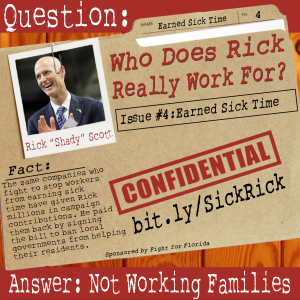“Politicians, from the Orange County commission to Gov. Rick Scott, have done everything in their power on behalf of special interests to prevent Floridians from enacting Earned Sick Time. The U.S. is the only major industrialized country without a minimum sick leave standard, but in recent years the policy has been enacted with great success in states and municipalities across the country. Sadly, thanks to Gov. Scott, Florida lawmakers and the special interest lobbyists controlling them, Floridians will continue to be denied this inexpensive, effective tool for promoting public health and strengthening working families.”
~Stephanie Porta, Executive Director, Organize Now
 Earned Sick Time (EST) is a benefit enjoyed by many Floridians. It allows workers to take care of themselves, sick children or relatives without the fear of being unable to pay the bills while protecting the public health. Public health concerns are particularly pronounced in the restaurant industry. A recent Centers for Disease Control study found that sick food handlers were the cause of 53 percent of norovirus outbreaks—the leading cause of foodborne illness[i]. But according to Bureau of Labor Statistics data, earned sick time is currently available to only 40 percent of service workers—who interact directly with the public—compared to 61 percent of the overall workforce.[ii]
Earned Sick Time (EST) is a benefit enjoyed by many Floridians. It allows workers to take care of themselves, sick children or relatives without the fear of being unable to pay the bills while protecting the public health. Public health concerns are particularly pronounced in the restaurant industry. A recent Centers for Disease Control study found that sick food handlers were the cause of 53 percent of norovirus outbreaks—the leading cause of foodborne illness[i]. But according to Bureau of Labor Statistics data, earned sick time is currently available to only 40 percent of service workers—who interact directly with the public—compared to 61 percent of the overall workforce.[ii]
Unfortunately, many Floridians are service workers who depend on minimum or low-wage jobs which do not provide this benefit. In fact, the severe shortage of quality jobs that pay a living wage here in Florida makes us the home to the second largest population of workers in the country making at or below minimum wage. Without EST, every time a worker takes a day off when they or a loved one are ill, they run the risk being unable to pay the bills. This forces many Floridians to go to work sick or send their children to school sick because they simply cannot afford to do otherwise.
Samantha Davis, a restaurant server and member of Restaurant Opportunities Center of Miami is just one of thousands of examples. “It doesn’t make sense that workers are not given earned sick time because then people go to work sick, spread whatever sickness they have to their coworkers and even customers. If a restaurant employee goes to work sick, they are undoubtedly getting other people sick. I’ve gone to work a few times feeling under the weather or with a bad cold because I couldn’t afford to lose the money from that day of work,” said Davis.
A 2012 Georgetown University report found that Florida was “poised to become a state of mostly low-wage and/or low-skilled jobs.”[iii] Because Governor Scott’s agenda prioritizes high-profit financial interests over the interests of workers, median wages across the state continue to be among the lowest in the nation. So, while Florida’s unemployment rates have decreased during his tenure, the jobs he has created have been low-wage, providing employment but keeping workers from adequately supporting themselves and their families.
The Research Institute on Social & Economic Policy at Florida International University found that, in 2012, 214,000 workers in Florida had incomes at or below minimum wage, representing a 6.68% increase annually since 2002. [iv] This represents the second largest total number of workers with earnings at or below the minimum wage in the country. [v] When workers earn low wages, they have less to spend even on basic needs, stymieing the growth of Florida’s economy that is needed for the state to truly recover from the Great Recession.
Recognizing this, local communities have endeavored to do what the Governor is afraid to do: pass legislation that would benefit Florida families, protect public health and pull the state out of the Recession. The Orlando Sentinel found that Orlando’s median pay “ranks last among the nation’s 50 biggest metropolitan areas, and it has the largest share of jobs -37%- paying less than $25,000 a year.[vi]” When the Orange County Commission failed to pass an EST ordinance, Orlando advocates gathered enough signatures to put the initiative on the ballot.
 That didn’t sit well with the County Commissioners, who resorted to a backroom maneuver to keep the proposed EST ordinance off the November ballot. They voted to delay the referendum saying they needed a month to make the title and summary less confusing. This delay would mean they would miss the ballot printing deadline and thus keep the measure off the ballot. They did this in coordination with lobbyists for interests opposed to the measure. This created a scandal known as “textgate”, when the Commissioners conveniently lost or deleted text messages that they had sent or received from lobbyists or other opponents of the ballot measure. These text messages revealed that County Commissioners were discussing stalling tactics with lobbyists during the board meeting. There isn’t a more real life example of corporations running our government then corporate lobbyists telling public officials what to do during a meeting as it is happening. A panel of judges later found that the Commissioners had violated the county charter, fined them and ordered the mandate to be appear on the ballot.
That didn’t sit well with the County Commissioners, who resorted to a backroom maneuver to keep the proposed EST ordinance off the November ballot. They voted to delay the referendum saying they needed a month to make the title and summary less confusing. This delay would mean they would miss the ballot printing deadline and thus keep the measure off the ballot. They did this in coordination with lobbyists for interests opposed to the measure. This created a scandal known as “textgate”, when the Commissioners conveniently lost or deleted text messages that they had sent or received from lobbyists or other opponents of the ballot measure. These text messages revealed that County Commissioners were discussing stalling tactics with lobbyists during the board meeting. There isn’t a more real life example of corporations running our government then corporate lobbyists telling public officials what to do during a meeting as it is happening. A panel of judges later found that the Commissioners had violated the county charter, fined them and ordered the mandate to be appear on the ballot.
That didn’t sit well with the Governor or state lawmakers who quickly led efforts in Tallahassee to block all municipalities in the state from enacting EST initiatives. Not surprising are the millions of dollars in campaign contributions that Darden, Disney and other opponents of EST have given to Scott and his buddies for reelection. The Governor used only four of the 15 days he legally had to review the pre-emption bill before he signed it on June 14, 2013. Once again showing who he really works for. According to a recent poll, 80 percent of Florida voters support earned sick time. But who cares about them? Certainly not Rick, who makes us sick.
For-profit politicians are not for Florida families.
For more information on Organize Now, please visit: www.orgnow.org/ or find them on Facebook at: https://www.facebook.com/OrgNow
For more information about Restaurant Opportunities Center of Miami, please visit: http://www.rocunited.org/Miami
[i] Centers for Disease Control and Prevention, Epidemiology of Foodborne Norovirus Outbreaks, United States, 2001–2008, CDC, accessed October 8, 2014, http://wwwnc.cdc.gov/eid/article/18/10/12-0833_intro
[ii] Bureau of Labor Statistics, Table 6. Selected paid leave benefits: Access, US Department of Labor, accessed October 8, 2014, http://www.bls.gov/news.release/ebs2.t06.htm
[iii] Lopez, A., 2012, Report: Low-Wage Jobs are Flooding Florida, Florida Center for Investigative Reporting, accessed October 8, 2014, http://fcir.org/2012/08/08/report-low-wage-jobs-are-flooding-florida/
[iv] Bustamante, A. and Griffin, J., 2013, State of Working Florida, Research Institute on Social and Economic Policy, Florida International University, accessed October 8, 2014, http://www.risep-fiu.org/wp-content/uploads/2013/09/State-of-Working-Florida-2013-FINAL.pdf
[v] Ibid.
[vi] Powers, S. and J. Stratton, 2013, Central Florida Metro Area Job Market is Lowest-Paying in Country, Orlando Sentinel, accessed October 8, 2014, http://articles.orlandosentinel.com/2013-09-07/business/os-orlando-low-pay-20130907_1_central-florida-research-park-metro-orlando-jobs
